2021 was our first full year as a virtual organisation and we seized the opportunity to deliver more for members on a truly global stage despite the continuing challenges of the pandemic.
We kept a laser focus on member needs and delivering value, introducing the Career Centre, Making the Most of Membership events and Best Practice Reports in Research, Evaluation and Measurement, Wikipedia Editing and Artificial Intelligence in PR.
Insight informed our work with our PR in a Pandemic Survey completed by 1,400 PR practitioners and nearly 900 members completing our member survey.
Virtual delivery of training courses, Chartership assessment, mentoring, conferences, and a huge programme of group events led by volunteers meant that CIPR learning and accreditation was available to all members regardless of location.
And it paid off with more than 1,900 new members and a further 52 practitioners becoming chartered.
new members
practitioners becoming chartered
members serving on our committees, groups, networks and panels
We celebrated the work of the 400 members who serve on our committees, groups, networks, and panels during Volunteers’ Week in June and showcased the best PR work globally, nationally, and regionally at our Excellence and PRide Awards.
We delivered training for our Board and Council in Diversity, Equality and Inclusion, improved the accessibility of all our communications and provided a BSL sign language interpreter at our Annual Conference. We know there is more to do, and that work continues in 2022.
We showed industry leadership with our responses to the lobbying scandals and provided powerful evidence to the Committee of Standards inquiry on lobbying and APPGs and the new report from the Committee on Standards in Public Life calling for greater transparency and regulation. And we staged a conference and a series of climate change themed events to tie in with COP26, ensuring PR practitioners had the tools and knowledge to advise their organisations and clients on best practice.
We joined with the PRCA to deliver the Heard Mentality campaign focusing on mental health. We also worked with the Global Alliance for Public Relations to promote PR globally through a series of themed months.
Despite being the most challenging year in our history we responded with purpose to deliver great member benefits, a strong financial performance and a real sense of collective energy from staff and volunteers.
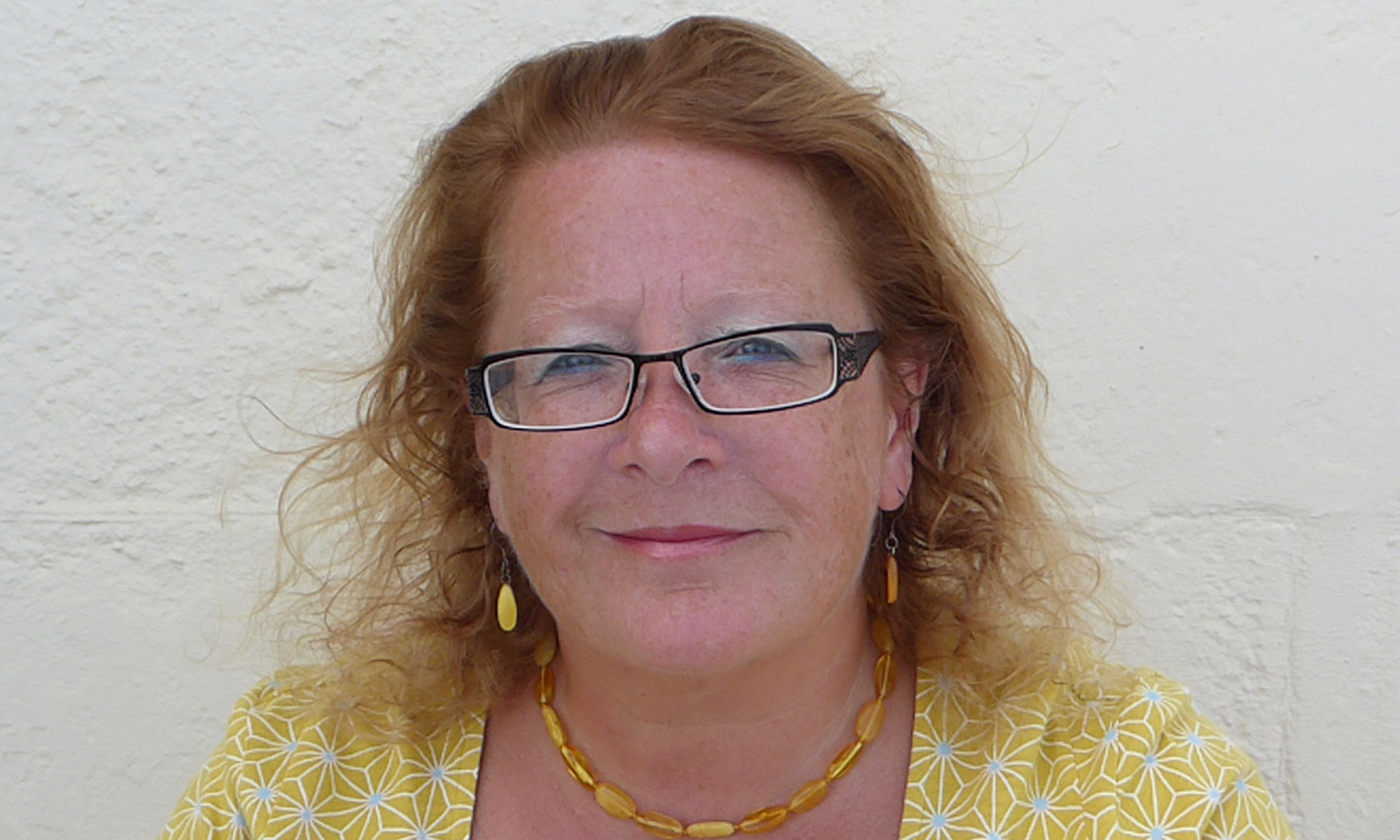
Mandy Pearse, Chart PR, FCIPR
President 2021
In 2019, in consultation with members, the CIPR developed a new five-year strategy and 2021 was the second year in which our work was planned and delivered as part of that strategy.
This report is structured around the four key areas of work set out in that strategy.
To create a better understanding of the standards and services that public relations professionals can offer.
To ensure that our members have timely access to the most up-to-date resources to take their professional practice forward.
To create a streamlined professional development pathway focused on Chartered Practitioner status.
To create the best and most valuable community that practitioners will want to be a part of and contribute to.
In April 2021, we published new research into the public's view of lobbying in the UK. The research – delivered through Opinium – revealed a distinct dissatisfaction with existing lobbying practices and the lack of access to adequate information about those seeking to influence the political agenda.
Our Public Affairs Group’s policy position paper called for the expansion of the register on lobbying to capture all lobbying activity as opposed to the small number of lobbyists it currently does.
Our announced partnership with I Have A Voice to support their work engaging young people with politics will ensure our message to promote the highest ethical standards in lobbying is heard by future leaders.

“The current system of transparency around lobbying is not fit for purpose. It is too difficult to find out who is lobbying government; information is often released too late; descriptions of the content of government meetings are ambiguous and lack necessary detail; transparency data is scattered, disparate, and not easily cross-referenced; and information in the public interest is often excluded from data releases completely. Reforms are needed to the accessibility, quality, and timeliness of government data.”
Committee on Standards in Public Life ‘Upholding Standards in Public Life’ report
The news agenda in 2021 meant we dedicated much of our focus on lobbying practices. We championed the importance of lobbying as an integral part of our democracy but called for greater transparency following revelations that former ministers and sitting MPs were engaged in paid consultancy work. In November 2021, we welcomed news of a House of Commons debate to consider banning MPs from paid consultancy work.
The UK government's proposed Online Safety Bill looks to address the issue of online harms but will have a far-reaching impact on those creating online content. We warned that government plans to increase criminal sanctions for tech executives could have a “perverse effect” on accountability and instead called for regulation to focus on personal liability, financial penalties and transparency reports to change company cultures.
In early February, we signed the International Declaration of Communications Professionals and Researchers for a Healthier, Viable Better World, committing our efforts to using our expertise as a force for good in society.
“Saving our planet is now a communications challenge”
David Attenborough
At our half-day climate change conference, we explored the role public relations and communications will play in tackling climate change globally. Welcoming a variety of expert speakers from the world of business, PR, marketing and beyond, the conference equipped communicators with expert advice to supporting their organisations and clients build sustainable practices.
Our national, regional and sector groups held ten events to support PR practitioners to better understand climate change issues and the impact of COP26 on the public relations industry.
We welcomed nearly 200 PR professionals to our 2021 Annual Conference as an array of expert speakers and practitioners explored the theme of stakeholder engagement in a changing world. Speakers across a number of sectors, industries, and disciplines explored the importance of stakeholder trust during the pandemic and the future of this fundamental area of work; from the opportunities and challenges presented by the virtual world to employee engagement, behavioural change and crisis management.
The conference provided delegates with an accessible and inclusive experience as we partnered with Involve Interpreter to enable attendees to watch the sessions with a BSL interpreter, with live closed captions, or with both.
“I am developing additional skills and I am taking on additional opportunities. It's almost future-proofing.”
Sarah Pinch, Consultancy/agency managing director
In July 2021, the annual State of the Profession survey took on a new direction as we launched the #PRinAPandemic report to reflect the challenges and experiences of PR and communications professionals throughout the pandemic.
With over 1,400 responses and 10 qualitative interviews from PR professionals, the #PRinAPandemic report authoritatively details the uneven impact of COVID-19 across organisation types, levels of seniority, ages, and roles.
Key findings:
“Comms people should believe in the worth of our own profession. The accountants and lawyers aren’t sitting there thinking ‘do you think it’s alright if I am a CEO?’ It never crosses their mind.”
Ruth Davison, CEO of Islington and Shoreditch Housing Association
We kicked off the new year with a new guide exploring how PR professionals can make the journey into leadership positions and the barriers which prevent them from doing so. ‘From Comms Professional to CEO’ - researched and written by Mike Browne MCIPR of How-Now Communications and 2020 CIPR Board member – includes first-hand experiences of those who have worked in PR and gone on to become CEOs.
Mike and fellow contributors to the guide discussed their experiences at an event which can be watched below.
Once again, we were proud to announce our support of the Global Alliance’s annual Ethics Month in February. We hosted a series of ethics-related webinars and blogs and launched own social media campaign to highlight the importance of adopting the highest ethical standards at the heart of PR practice.
Watch the first ethics webinar
In March, we published an extensive 48-page professional practice review into research, measurement and evaluation. Edited by Dr Heather Yaxley FCIPR PhD, with contributions from Andrew Smith Chart.PR Hon.FCIPR and Dr Jon White Chart.PR Hon.FCIPR, the guide provides members with a single, all-encompassing source of insight and information relating to PR research, measurement and evaluation.
Download the guide (log in required)
Our AIinPR Panel delivered a global research study in an exclusive partnership with the Arthur W Page Society to examine the profession's preparedness for an AI future. The report found practitioners see the immense potential that artificial intelligence (AI) can offer and are eager to learn more about its application but have limited knowledge and a lack of confidence in where to begin.
The ‘CIPR Business Leaders Survey’, launched in December 2021, surveying 300 C-suite level managers and directors on their organisation’s PR function and their future needs for PR services. The report finds that two-thirds of UK business leaders are planning to recruit public relations staff of hire agencies for PR support in the following three months.
Influence evolved as a digital magazine and moved to a new website to give members a more user friendly and accessible reading experience. Influence continued to bring members the perfect blend of thought-provoking and practical articles and features.
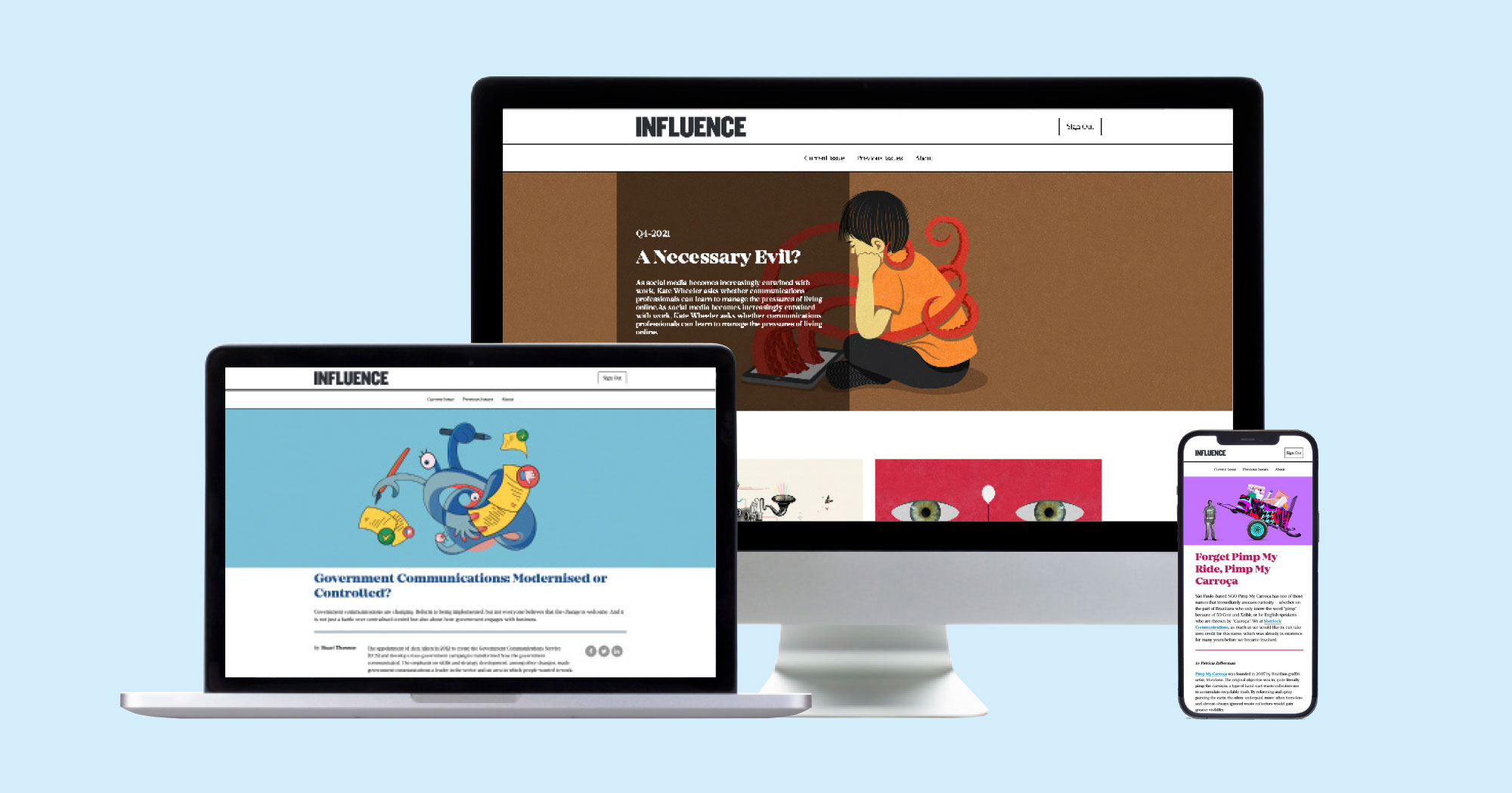
Following the transformation of our Chartership assessment days to a virtual model in 2020, we saw an influx of members seeking to demonstrate their commitment to the highest level of professional accreditation. In 2021, we reached a milestone of over 400 Chartered PR Practitioners as 52 members achieved chartered status across 15 Assessment Days.
Throughout 2021, we awarded Fellowship to 18 practitioners for their outstanding contribution to the profession and the Institute. As ambassadors for the CIPR, Fellows drive forward our values of a commitment to life-long learning, professionalism, and ethical practice.
Members continued to demonstrate their commitment to their professional development in 2021 as 2,194 members completed the CPD cycle and over 23,000 CPD activities were recorded.
We teamed up with the Global Alliance to support their Education and Training Month in April by sharing a selection of free webinars to provide the global PR community with access to valuable learning resources.
The pandemic accelerated our organic global growth. In 2021, PR professionals continued to join us and benefit from our products and services in countries around the world.
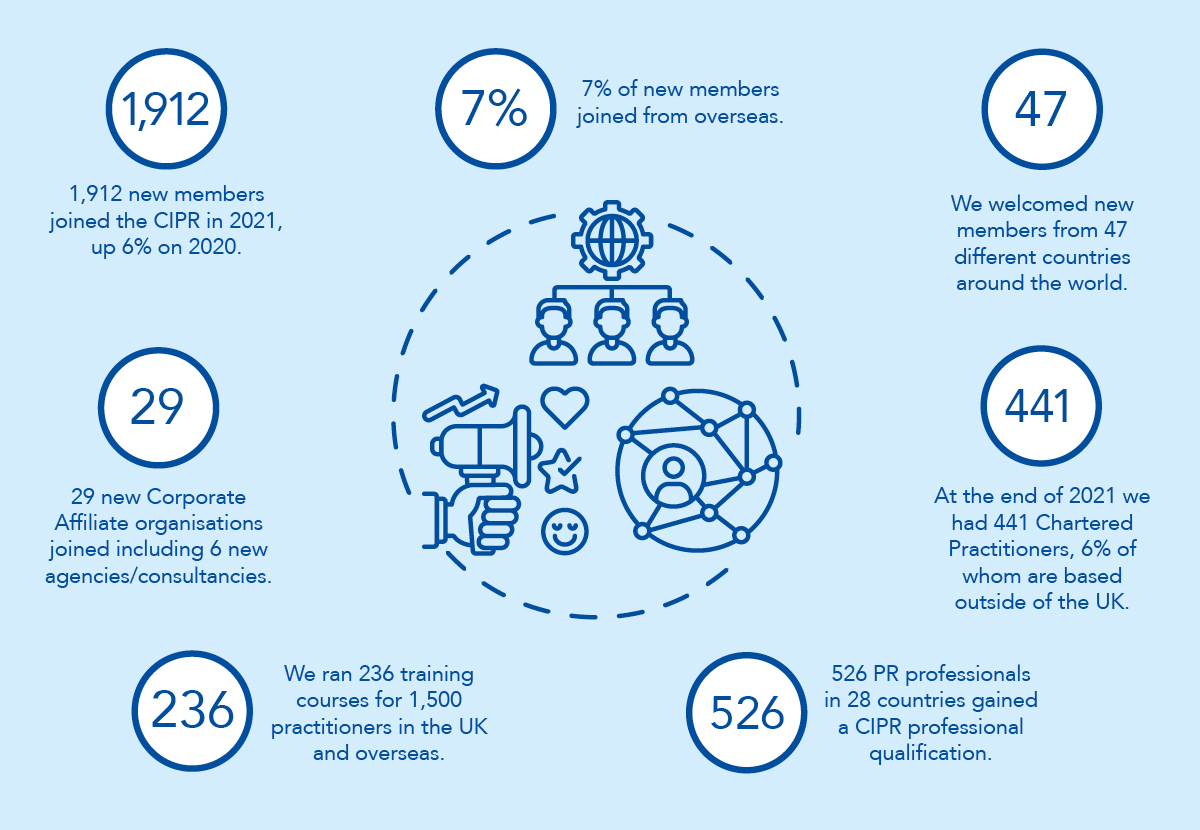
Together with the Public Relations and Communications Association (PRCA), we launched the Heard Mentality campaign aimed at inspiring PR and communications professionals to take positive action on mental health across the industry.
The campaign equipped individuals and organisations with conversation starter packs and video resources for tools and tips to host these potentially challenging conversations.
As part of our partnership with the PRCA, we published a new research study – Workplace Wellbeing Mental Health Audit 2021 – to explore the mental health challenges PR professionals face. The research – conducted by Opinium – found nine in ten (90%) PR professionals have struggled with their mental wellbeing to an extent over the past 12 months, compared to 65% of UK workers.
The CIPR Health Group led on a series of case studies designed to equip practitioners with key tools and tips for embedding mental health initiatives and policies in their organisation. The series featured a variety of agency, in-house and public sector teams.
We collaborated with the Institute of Internal Communication (IoIC) to publish a best practice guide that provides a framework for professionals when communicating the death of a colleague by suicide or possible suicide. The guide – ‘Helping organisations when they need to communicate suicide’ –outlines a process on how to prepare for, respond to, communicate, and manage communication related to a suicide internally and externally including with the press and authorities.
The start of 2021 presented a significant challenge under lockdown, including to parents with schools still closed due to the pandemic. Our ‘PR and Parenting in a Pandemic’ was a free resource for all and included articles, advice, and a PR-themed children’s activity pack to support practitioners at this difficult time.
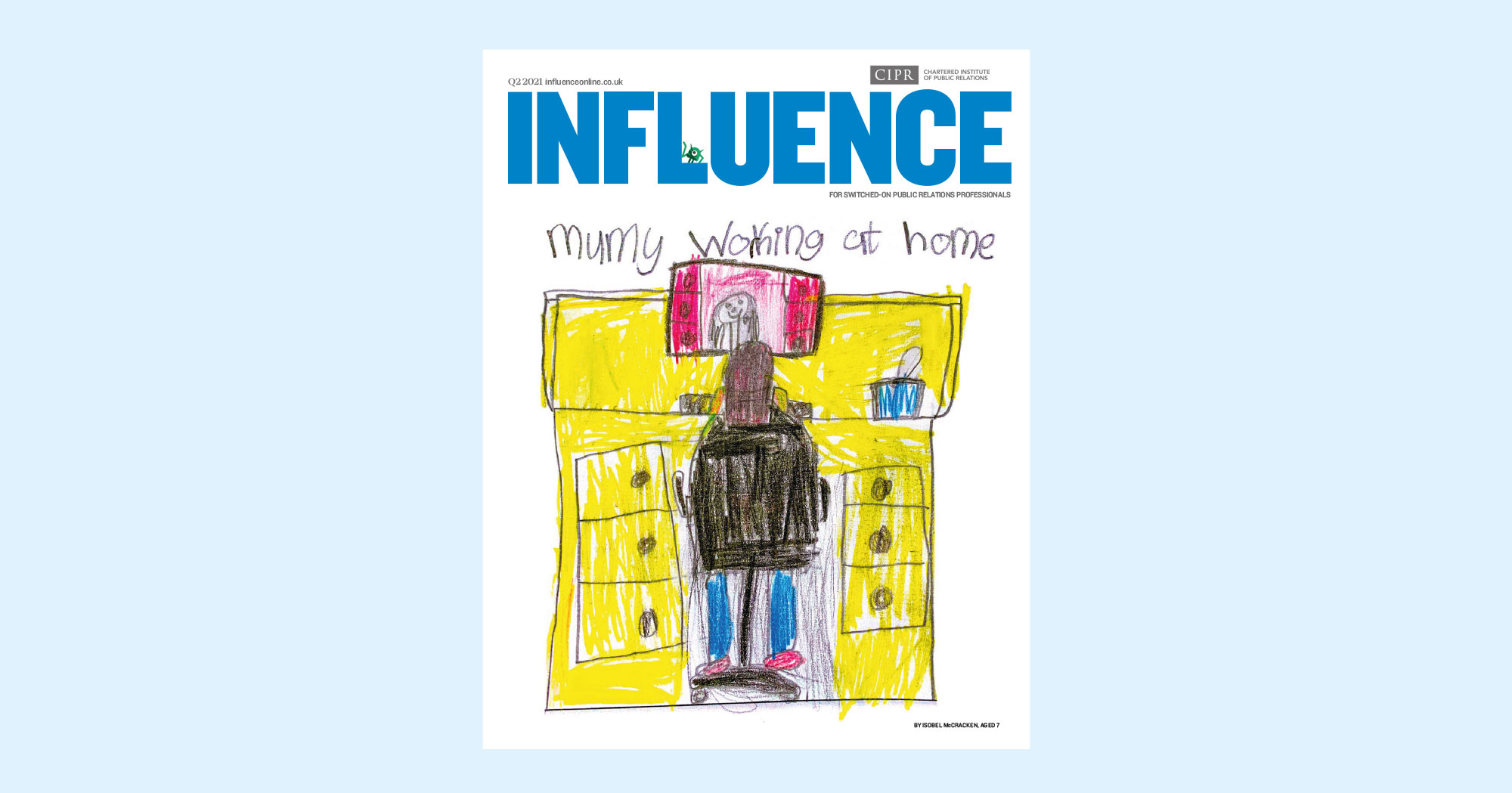
September saw us launch the PR industry’s first Reverse Mentoring Scheme, in collaboration with the Taylor Bennett Foundation. Following 2020’s ‘Race in PR’ report, this scheme aims to address the lack of retention of talented Black, Asian and ethnic minority PR and communications professionals and attempts to drive lasting change by pairing them with senior leaders.
The pilot scheme is due to be completed in June 2022 and the findings will inform future initiatives and training in this area.
In March, we announced our partnership with The Xec. - a new leadership scheme created and launched by BME PR Pros. Successful applicants joined a 10-month practical course packed with training days, masterclasses and career-focused talks. This included free membership of the CIPR, the opportunity to judge our awards, and CPD points.
In February, we partnered with the Media Trust to address the lack of social mobility and diversity within the PR profession. Our partnership provides 50 young people with access to a CIPR student membership as well as access to our student mentoring scheme. This partnership aims to provide marginalised groups and young people a stronger voice by bridging the gap between the media and creative industries and broader society.
In November we announced our support of Socially Mobile, a new, not-for-profit PR school set up by two former CIPR Presidents, Stephen and Sarah Waddington, designed to help PR practitioners from disadvantaged backgrounds and under-served groups to increase their earning potential. The first cohort of successful applicants were able to benefit from CIPR membership.
As we entered spring, our new ‘CIPR Career Centre’ launched to provide a free, member-exclusive, virtual career management platform including a range of interactive tools, e-learning content, a job search engine and so much more.
CIPR members can benefit from a bespoke and sophisticated experience designed to help them navigate the job market with confidence.
Corporate Affiliate members grew by 29. The expansion of our membership team renewed our focus on recruiting a diverse set of organisations to our Corporate Affiliate community.
Following the launch of our quarterly Engage podcast in November 2020, our Podcast Editorial Board delivered four insightful episodes with guest speakers in 2021 exploring these topics:
Our volunteer-led national, regional, and sector groups and special interest networks continued to address the needs of members throughout the year with events, research, and partnerships.
The following sections feature activities from a selection of our groups and networks.
In 2021 our Board was comprised entirely of chartered public relations professionals. Members who become chartered demonstrate their individual capability and expertise in strategy, leadership and ethical practice. The chartership journey gives PR professionals the confidence to apply for leadership positions and to excel in them.
Thank you to our Board and Council for their commitment and support throughout 2021.
Organisations are increasingly reporting on Environmental, Social and Governance (ESG) aspects of their performance, and PR professionals are often expected to contribute or lead on the preparation of such reports. Although it is not a requirement for the CIPR, we intend to begin producing an ESG report for the 2022 operational year and will do so annually thereafter.
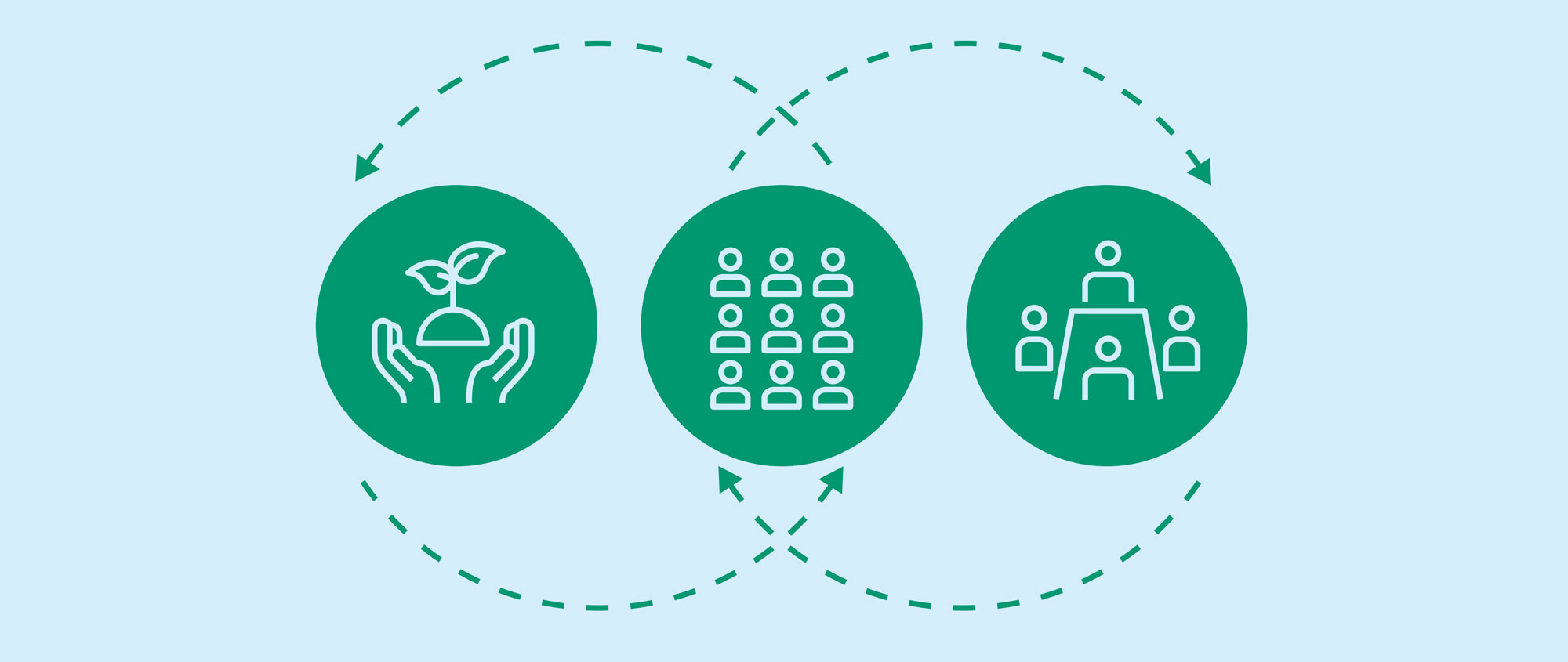
The CIPR has a relatively low environmental footprint, even compared with other professional associations of similar size. Since 2020 we have operated without an office, have no photocopier, only produce a small volume of material, and run most of our meetings and training virtually.
We took two major steps during the year – the first was to commit to Net Zero by signing the SME Climate Commitment to halve greenhouse gas emissions before 2030 and achieve net zero emissions before 2050. The second was our decision to keep Influence magazine in a digital format, which means the reductions achieved in 2020 will be permanent.
In 2022 we will select an environmental measurement standard and begin reporting against it.
The governance structure of the CIPR is described in our published annual accounts, as are our accounting policies and disclosures on executive pay.
We commissioned a light-touch review of our governance documents from specialist consultants, with a brief to identify anything in them that might not be up to date with current good practice in professional bodies, or which might have the unintended discriminatory effects.This gave us a number of action points to consider for future reform.
In the coming year we will begin to act on the report we commissioned, focusing particularly on the governance of our process of handling complaints in the first instance.We will also begin work on policies and reports covering Board diversity, corporate behaviour, and business ethics.
Our activities in this area have been particularly focused in recent years on the development of human capital and the strengthening of our cybersecurity (we have held CyberEssentials certification since 2019).
Our development of human capital falls under several headings. Two of our major organisational activities are the provision of training to our sector and the offer of professional qualifications; we also offer a structured system of continuing professional development and informal learning through networking and volunteer-led events. In addition, we train and develop our employed staff and have recently begun to offer additional development opportunities to our volunteers, over and above the general offer to our members.
In addition to the work we do ourselves, we also partner with several organisations to promote opportunities in the broader public relations sector to people from disadvantaged backgrounds.
In the summer of 2021, we surveyed staff following our move to a virtual organisation that led to the development of a remote working agreement and are in the process of creating a CIPR culture play book and developing a set of line managers' principals.
All CIPR Board and Council members were invited to attend a one-day DEI workshop to address the lack of DEI in our industry and to reconfirm our commitment in this area. This was then offered to all our volunteers.
We are continuing to engage with staff as well as expanding this work to volunteer groups and will be revisiting the CIPR values and behaviours.
We signed up to undertake the National Equality Standard in March 2022 to find areas of improvement and enable us to create a pathway to ensure the CIPR represents best practice in this area.
Our audited accounts for 2021 were issued in June 2022.
| Type | 2021 | 2020 |
|---|---|---|
| Income | £3,092,778 | £2,941,480 |
| Pre-Tax Expenditure | £2,716,338 | £2,821,763 |
| Of which staff costs | £1,325,125 | £1,201,445 |
| Pre-Tax Surplus | £376,440 | £119,717 |